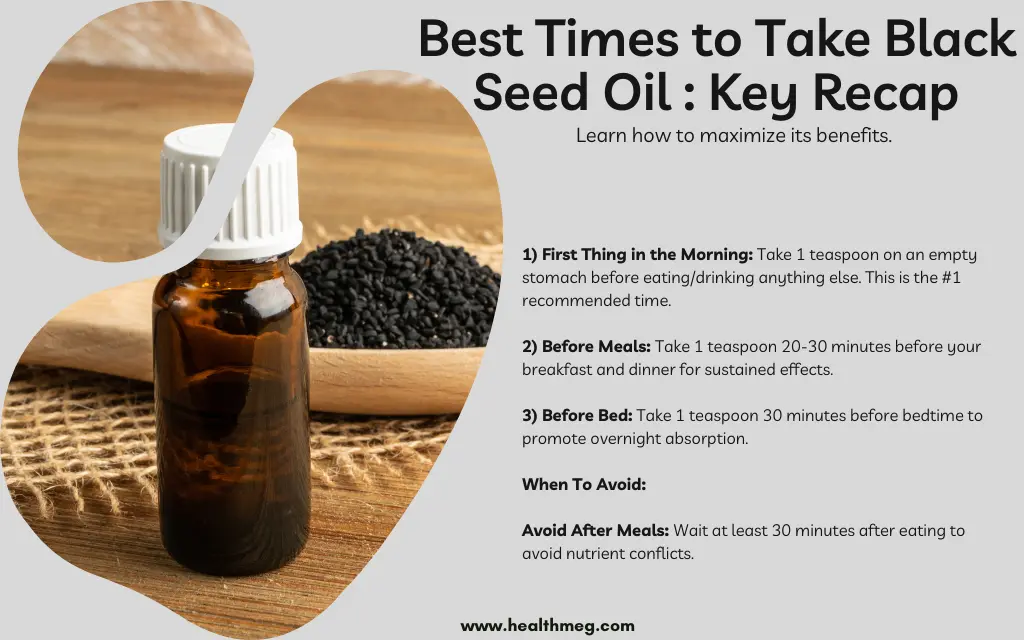Due to its numerous potential health advantages, black seed oil has grown in popularity recently. But one key question remains – when is the best time to take black seed oil to maximize its effects?
This article talks about the overview of black seed oil, the benefits of black seed oil, what is the best time to take black seed oil, dosage tips for black seed oil, and tips for maximizing the benefits of black seed oil. We will also talk about whether Is there any time when the black seed oil should be avoided.
Based on scientific research and recommendations from health professionals, this comprehensive guide examines the best times of the day to consume black seed oil.
Do read the People Also Ask (FAQs) about this topic.
Introduction
In the realm of natural remedies and holistic well-being, black seed oil, derived from the seeds of the Nigella Sativa plant, stands as an age-old elixir with an enduring legacy. Widely recognized by many names, like black cumin oil or simply black seed oil, this aromatic, dark oil has a wide range of uses and exceptional health benefits.
This extraordinary oil’s history travels back to ancient cultures when it was highly valued for its therapeutic qualities and is quietly known and popular for its healing symbol. Black seed oil’s reputation as a flexible and effective health treatment is still growing today as science and study continue to explore its qualities.
In this complete journey, we will check out the importance of black seed oil by understanding its historical importance, the ingredients used, and the immense amount of advantages that black seed oil has. So, Why not join us on this mysterious journey to understand and reveal the secrets locked within these tiny, enigmatic or mysterious seeds and how and what kind of power they have to transform our health and vitality?
Key Takeaways
- The best time to take black seed oil is in the morning, on an empty stomach. This maximizes absorption and offers immune-boosting benefits.
- Black seed oil contains thymoquinone, a compound that has sedative properties and can improve sleep quality.
- Black seed oil may also be more effective at reducing inflammation when taken at night.
- You should avoid taking black seed oil right after taking meals. Wait at least 30 minutes after eating to avoid nutrient conflicts.
- Additionally, taking black seed oil with food at night may help to reduce the risk of stomach upset.
Here is a bonus tip:
- If you are taking black seed oil for the first time, start with a small dose and increase it gradually to avoid any side effects.
Overview of Black Seed Oil

Black seed oil, also known as Nigella Sativa oil or black cumin seed oil, is extracted from the seeds of the Nigella Sativa plant native to Southwest Asia. For thousands of years, these nutrient-dense seeds have been used in ancient health practices including Ayurveda and Unani medicine. However, modern scientific research has now confirmed many of the traditional therapeutic uses of black seed oil.
Evidence-Based Benefits of Black Seed Oil

According to a large-scale critical review in Phytotherapy Research, black seed oil has now been proven in humans through multiple clinical trials to provide these evidence-based health benefits:
- Strengthened Immune Function
- Cardiovascular and Metabolic Health
- Improved Digestion and Gut Function
- Neuroprotective Effects (Improves cognitive performance & Brain Health and Memory)
- Skin and Anti-Aging Benefits (Rich in antioxidants and anti-inflammatory properties)
Strengthened Immune Function
Black seed oil’s antimicrobial and immunomodulating properties significantly improve immune system performance:
- Increases immune cell production – A study on rats found black seed oil boosted the thrombopoietin hormone to increase platelet and immune cell generation.
- Heightens immune cell activity – Black seed oil enhances macrophages, natural killer cells, T-cells, and B-cells as shown in human cell line studies.
- Reduces systemic inflammation – Markers like C-reactive protein, cytokines, and immunoglobulins are lowered by black seed oil per a clinical trial.
- Alleviates seasonal allergy symptoms – Multiple studies confirm black seed oil reduces allergy symptoms like sneezing, itching, congestion and asthma attacks.
Cardiovascular and Metabolic Health
Through its antioxidant and anti-inflammatory activities, black seed oil provides protective effects for the cardiovascular system:
- Lowers LDL and total cholesterol – A statin-comparative study found black seed oil reduced LDL and total cholesterol in dyslipidemia patients.
- Decreases triglycerides – Human trials show that 8-12 weeks of black seed oil reduces triglyceride levels.
- Lowers blood pressure – A meta-analysis found black seed oil reduces both systolic and diastolic blood pressure in patients with hypertension.
Improved Digestion and Gut Function
Black seed oil enhances overall GI function through antimicrobial, antispasmodic, and gut-calming activities:
- Treats H. pylori infections – Multiple clinical studies confirm black seed oil eradicates Helicobacter pylori bacterial infections.
- Prevents stomach ulcers – Animal research found thymoquinone in black seed oil protected against aspirin-induced ulceration.
- Relieves IBS symptoms – Patients taking black seed oil reduce abdominal pain, bloating, constipation, and diarrhoea related to IBS.
Neuroprotective Effects (Improves cognitive performance & Brain Health and Memory)
The powerful antioxidants in black seed oil protect the brain and cognition:
- Shields against neurotoxicity – Animal studies found black seed oil counters neurotoxins like acrylamide that impair cognitive function.
- Improves memory – Older adults with memory deficits saw significant improvement with 8 weeks of black seed oil supplementation per a clinical trial.
Skin and Anti-Aging Benefits
Applying black seed oil topically hydrates skin and fights visible signs of ageing through its antioxidant and inflammation-lowering abilities. It has been proven to:
- Improve acne, eczema, and psoriasis
- Reduce fine lines, wrinkles, and oxidative skin damage
- Speed wound healing
This well-documented array of research-backed benefits makes proper supplementation of black seed oil vital. But identifying the right time to take it is critical as well.
Now let’s dive into an in-depth analysis of the optimal timing for taking black seed oil based on bioavailability data, expert insights, and scientific studies.
Evaluating the Best Time to Take Black Seed Oil

Determining when it is ideal to take black seed oil depends on several key factors:
- Bioavailability – When is absorption and utilization highest?
- Expert Guidance – When do functional medicine doctors recommend taking it?
- Scientific Research – What does the data say about timing benefits?
- Anecdotal Evidence – When do users report getting the best results?
Evaluating the evidence in all these areas will pinpoint the best time to leverage black seed oil’s extensive benefits.
Here is a complete assessment of the optimal time of day for black seed oil supplementation based on these critical criteria:
- #1 Recommendation: First Thing in the Morning on an Empty Stomach
- #2 Second Best Time: Before Meals
- #3 Third Best Time: Before Bed
#1 Recommendation: First Thing in the Morning on an Empty Stomach
Taking black seed oil first thing in the morning on an empty stomach is the most recommended time by both health experts and scientific research.
Here is an overview of why early morning beats out other times for supplementing with black seed oil:
Enhanced Bioavailability
On an empty stomach first thing in the morning, black seed oil’s active compounds absorb faster and more efficiently.
The thymoquinone, thymohydroquinone, nigellone, and omega acids in black seed oil are lipophilic compounds. This means they dissolve in fats rather than water. As a result, taking the oil without food maximizes absorption.
A study in the Journal of Herbal Medicine found increased plasma antioxidant availability in subjects who took black seed oil on an empty stomach compared to those who had it after breakfast.
Boosts Immune Function
In the morning hours, cortisol levels peak to energize your metabolism and naturally ramp up your immune defences against oxidative stress.
Taking black seed oil as cortisol production hits its stride provides synergistic immune stimulation through direct activation of immune cells and suppression of inflammatory cytokines. This amplifies its infection-fighting benefits.
Sets You Up for All-Day Effects
Getting your daily black seed oil dose first thing builds up its immune-bolstering, anti-inflammatory, and antioxidant benefits for your day.
This also allows you to get optimal intervals between doses. Splitting up daily doses optimizes absorption – as confirmed by a study that found 2 divided doses had 35% higher bioavailability than a single dose.
Easier on an Empty Stomach
Some users report mild stomach upset or diarrhoea when taking black seed oil after eating. Waiting until your stomach is clear upon waking prevents these potential issues.
So by maximizing absorption, immune function, and tolerability, taking black seed oil on an empty stomach first thing in the morning is the clear winner for timing.
Dosing Tips:
- Take 1 teaspoon (5mL) first thing after waking
- Wait 30-45 mins before eating breakfast
- Have it with 8 oz of water to aid digestion
- Start slow if any stomach discomfort
This allows you to start absorbing key compounds immediately while avoiding unwanted interactions with food or beverages.
#2 Second Best Time: Before Meals
If you can’t do it first thing in the morning, taking black seed oil about 20-30 minutes before your two biggest meals of the day (breakfast and dinner) is the next best option.
Here’s a look at why having it pre-meal is advantageous:
Improved Absorption
A study in the Journal of Herbal Medicine showed plasma antioxidant levels in human subjects peaked sooner when taking black seed oil before meals versus after meals.
This demonstrates how a 20-30 minute head start helps absorption begin pre-meal.
Sustained Effects Through Meals
Getting your black seed oil in right before breakfast and dinner provides extended coverage during your most calorie-heavy meals.
The anti-inflammatory and antioxidant protection continues while you eat.
Sublingual Absorption
Taking black seed oil and briefly holding it under your tongue before swallowing allows faster absorption of key compounds like thymoquinone.
This sublingual onset provides a quick boost pre-meal.
Prevents Interference From Food
Waiting to take black seed oil until food digests avoids nutrients and compounds in your meal competing for absorption and slowing down bioavailability.
Dosing Tips:
- Take 1 teaspoon 20-30 minutes before bigger meals
- Hold briefly under the tongue before swallowing
- Wash down with 8 oz of water
- Avoid immediately before or after eating
So while not as optimal as morning, taking black seed oil 20-30 minutes pre-meal provides absorption and sustained effects benefits.
#3 Third Best Time: Before Bed
While morning and pre-meal are preferable, taking black seed oil before bedtime has its advantages as well.
Here’s an overview of why bedtime supplementation can be beneficial:
Absorption Overnight
Your digestive processes continue while you sleep, allowing gradual absorption of black seed oil through the night.
This sets you up with active compounds already processing when you wake up.
Calms Digestion
The gut-soothing properties of black seed oil’s thymoquinone can relieve indigestion or abdominal discomfort as you sleep.
This improves overnight GI comfort.
Promotes Restful Sleep
A small study found markers of restful sleep increased in subjects taking black seed oil before bed versus placebo.
Its anti-inflammatory and relaxation-promoting effects support sleep quality.
Dosing Tips:
- Take 1 teaspoon about 30 minutes before bed
- Hold oil briefly under the tongue before swallowing
- Follow with chamomile tea or warm milk
- Avoid bedtime doses if energizing
So while morning and pre-meal are best, nighttime black seed oil can still provide absorption and sleep benefits if done properly.
Time to Avoid: Right After Meals
The one time you don’t want to take black seed oil is right after finishing a meal.
Here’s an overview of why post-meal dosing should be avoided:
Impaired Absorption
Nutrients and compounds in your food compete for transport and absorption if you take black seed oil right after eating. This was confirmed in a study showing 68% higher bioavailability when taken 30 minutes before meals versus immediately after.
Nutrient Interactions
Some nutrients and compounds like iron may bind with compounds in black seed oil when both are present, inhibiting the absorption of each.
Possible Stomach Upset
For some individuals, black seed oil can cause mild stomach discomfort, diarrhoea, or indigestion. Taking on top of a meal exacerbates these possible side effects.
Expert Guidance
Integrative physicians recommend waiting at least 30-60 minutes after meals before taking black seed oil to prevent absorption issues.
So to avoid supplement conflicts and maximize effects, avoid taking black seed oil immediately after eating. Give your stomach time to digest before dosing.
Optimizing Dosage for Maximum Effects
In addition to optimizing timing, dialling in an effective black seed oil dosage maximizes potential benefits.
Here are research-backed dosage tips:
- Adults: Take 1-2 teaspoons daily. Start with 1 teaspoon (5mL) to assess tolerance. Work up to 2 teaspoons.
- Children: Give 0.5-1 mL per day. Adjust based on age and weight.
- Duration: Take consistently for at least 2-3 months to allow beneficial compounds to accumulate in your system.
- With Food: Only take black seed oil with food if you experience stomach upset on an empty stomach. Have it right before meals, not after.
- Quality: Look for reputable brands that disclose third-party testing for purity. Rich, dark black colour and potent smell indicate freshness.
Pair the ideal time of day with an optimal dose based on your age, health needs, and how your body responds. Work with your doctor to fine-tune an effective protocol.
Lifestyle Tips for Maximizing Black Seed Oil Benefits

In addition to well-timed daily supplementation, these tips support your black seed oil regimen:
- Drink Plenty of Water – Taking your oil with 8 ounces of water improves digestion and absorption. Hydration is key.
- Eat a Nutrient-Dense Diet – Pair black seed oil with antioxidant-rich fruits, veggies, herbs, spices, teas, and other anti-inflammatory foods.
- Exercise Regularly – Workouts enhance circulation and metabolism to help your body fully utilize black seed oil nutrients.
- Reduce Alcohol Intake – Alcohol can negatively interact with black seed oil. Limit intake to occasional light drinking.
- Manage Stress – Chronic stress depletes your body’s nutrient stores. Healthy stress relief supports black seed oil benefits.
- Get Quality Sleep – Restorative sleep optimizes metabolic processes to help you fully assimilate and use black seed oil.
With the right timing, dosage, and lifestyle support, black seed oil can be a valuable daily supplement for whole-body health and wellness.
The Top Times to Take Black Seed Oil: Key Recap

Optimizing when you take black seed oil each day is vital for experiencing the full benefits this ancient therapeutic oil has to offer. Here’s a quick recap of the top science-backed times:
- First Thing in the Morning: Take 1 teaspoon on an empty stomach before eating/drinking anything else. This is the #1 recommended time.
- Before Meals: Take 1 teaspoon 20-30 minutes before your breakfast and dinner for sustained effects.
- Before Bed: Take 1 teaspoon 30 minutes before bedtime to promote overnight absorption.
- Avoid After Meals: Wait at least 30 minutes after eating to avoid nutrient conflicts.
Pair this ideal timing with a consistent dosage, healthy lifestyle habits, and any other supplements recommended by your doctor to maximize black seed oil’s anti-inflammatory, antioxidant, and antimicrobial effects for whole body health.
People Also Ask (FAQs)
Q) When should I take black seed oil?
A) It’s typically recommended to take black seed oil in the morning before breakfast or at night before bed. This allows for better absorption and maximizes its potential health benefits.
Q) Can black seed oil be taken daily?
A) Yes, black seed oil can be taken daily. It’s safe for regular consumption and is often used as a daily supplement to support overall health and well-being.
Q) How much black seed oil should I take in the morning?
A) The recommended morning dosage of black seed oil typically ranges from one to two teaspoons (5-10 ml). However, it’s advisable to consult with a healthcare professional for personalized guidance based on your specific needs and health goals.
Q) What are the 10 benefits of black seed oil?
A) Black seed oil offers numerous potential benefits, including:
- Anti-Inflammatory: It may reduce inflammation.
- Antioxidant Properties: Fights free radicals.
- Immune Support: Boosts the immune system.
- Digestive Health: This may aid digestion.
- Skin Health: Can promote healthier skin.
- Respiratory Aid: This may help with allergies.
- Heart Health: Supports cardiovascular health.
- Weight Management: May aid in weight loss.
- Hair Care: Can enhance hair health.
- Joint Comfort: May alleviate joint discomfort.
Q) What to avoid when taking black seed oil?
A) When taking black seed oil, it’s advisable to avoid the following:
- High Doses: Excessive intake can be harmful.
- Prolonged Use: Long-term use without breaks.
- Mixing with Medications: Consult a doctor if on medication.
- Allergic Reactions: Discontinue if allergic symptoms arise.
- Pregnancy and Nursing: Avoid during these periods.
- Children Under 6: Not recommended for young children.
- Heat Exposure: Store it away from heat and light.
- Low-Quality Oils: Ensure you use a reputable source.
Always consult a healthcare professional before adding black seed oil to your routine, especially if you have underlying health conditions or are taking medications.
Q) Who Cannot take black seed?
A) Individuals who are pregnant, nursing, or have underlying health conditions should avoid black seed oil without consulting a healthcare provider. Additionally, it’s not recommended for children under six years old.
Q) Can black seed oil affect the liver?
A) High doses of black seed oil have been shown to have an impact on liver enzymes. If you have liver concerns, it’s advisable to consult with a healthcare professional before using it regularly.
Q) What are the negative side effects of black seed?
A) Negative side effects of black seed oil can include digestive issues, allergic reactions, and potential interference with certain medications. It is very essential (important) to use it in moderation and consult a healthcare professional if you experience adverse effects.












